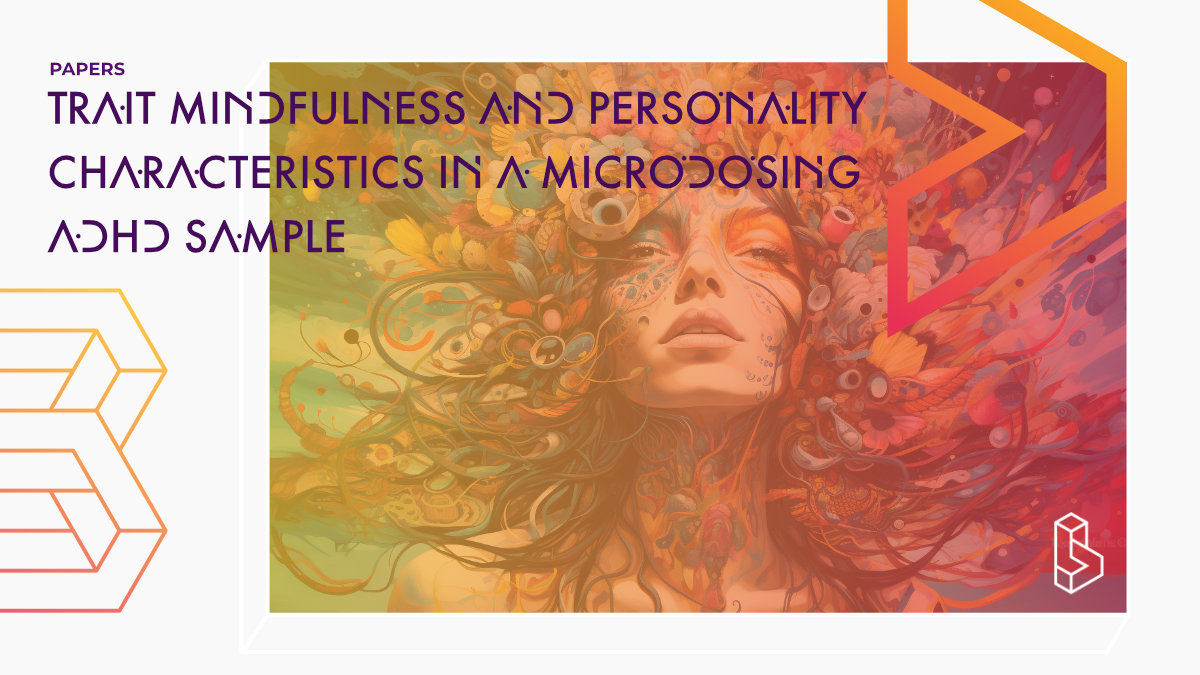This observational study (n=233) investigates the impact of four weeks of microdosing (MD) on mindfulness and personality traits in adults with ADHD. Findings indicate increased mindfulness and decreased neuroticism post-MD, with no significant changes in other personality traits. The use of conventional ADHD medication or the presence of comorbidities didn’t affect the outcomes, suggesting MD may alter stable traits independently of these factors.
Abstract of Trait mindfulness and personality characteristics in a microdosing ADHD sample
“Background: Microdosing (MD), repeatedly taking psychedelics in small, non-hallucinogenic amounts, has been practiced by individuals to relieve attention deficit hyperactivity disorder (ADHD) symptoms. Generally, adults diagnosed with ADHD have lower levels of mindfulness and differ in personality structure from non-ADHD adults. How MD affects mindfulness and personality in adults with ADHD remains unexplored.
Aim: This study aimed to investigate the effects of 4 weeks of MD on mindfulness and personality traits in adults diagnosed with ADHD and those experiencing severe ADHD symptoms. It was expected that mindfulness and the personality traits conscientiousness, extraversion, agreeableness, and openness would increase and neuroticism would decrease after 4 weeks of MD compared to baseline. It was explored if using conventional ADHD medication alongside MD and/or having comorbidities influenced MD-induced effects.
Methods: An online prospective naturalistic design was used to measure participants before MD initiation and 2 and 4 weeks later. Validated self-report measures were used assessing mindfulness (15-item Five Facet Mindfulness Questionnaire) and personality traits (10-item version of the Big Five Inventory) at three time points.
Results: The sample included n = 233, n = 66, and n = 44 participants at the three time points, respectively. Trait mindfulness, specifically description and non-judging of inner experience, was increased, and neuroticism was decreased after 4 weeks of MD compared to baseline. The remaining personality traits remained unchanged. Using conventional medication and/or having comorbid diagnoses did not change the MD-induced effects on mindfulness and personality traits after 4 weeks.
Conclusion: MD induced changes in otherwise stable traits. Future placebo-controlled studies are warranted to confirm whether these changes occur in a controlled setting.”
Authors: Eline C. H. M. Haijen, Petra P. M. Hurks & Kim P. C. Kuypers
Summary of Trait mindfulness and personality characteristics in a microdosing ADHD sample
Attention deficit hyperactivity disorder (ADHD) is a common developmental disorder, and some adults with ADHD report using low, sub-hallucinogenic doses of psychedelic substances repeatedly to self-treat their symptoms. This population has a different personality and trait mindfulness profile than the neurotypical population.
Trait mindfulness can be described as the inherent general tendency to be mindful in daily life, and can be divided into two dimensions: self-regulation of attention and acceptance. Self-regulation of attention involves attending, observing, and becoming aware of one’s thoughts, feelings, and sensations. Individuals diagnosed with ADHD scored on average lower on trait mindfulness compared to individuals without an ADHD diagnosis, though enhanced levels of mindfulness have been reported after MD.
Find this paper
https://doi.org/10.3389/fpsyt.2023.1233585
Open Access | Google Scholar | Backup | 🕊
Cite this paper (APA)
Haijen, E. C., Hurks, P. P., & Kuypers, K. P. Trait mindfulness and personality characteristics in a microdosing ADHD sample: a naturalistic prospective survey study. Frontiers in Psychiatry, 14, 1233585.
Study details
Topics studied
Personality
Microdosing
Study characteristics
Observational
Participants
233
Humans
Linked Research Papers
Notable research papers that build on or are influenced by this paper
Effects of Psychedelic Microdosing versus Conventional ADHD Medication Use on Emotion Regulation, Empathy, and ADHD Symptoms in Adults with severe ADHD symptoms: A Naturalistic Prospective Comparison StudyThis prospective survey (n=233, 64, 44) explores microdosing's (MD) impact on emotional regulation (ER) and empathy in adults with severe ADHD symptoms. Positive effects on ER and empathy were observed, specifically in cognitive reappraisal, expressive suppression, perspective-taking, and personal distress. However, a comparison with those using only conventional medications (n=180, 50, 38 MD; n=37, 27, 28 conventional) revealed that after four weeks, only expressive suppression improvement persisted, and cognitive reappraisal and empathy enhancements disappeared.
Microdosing with psychedelics to self-medicate for ADHD symptoms in adults: A prospective naturalistic study
This prospective survey study (n=247) finds that those who microdose psychedelics to manage ADHD symptoms experience benefits from it. Participants scored higher on well-being after two and four weeks. The study design, a prospective survey, makes it possible to draw causal inferences (microdosing causing the improvement), but the study had a large drop-out rate (n=46 at 4 weeks).

